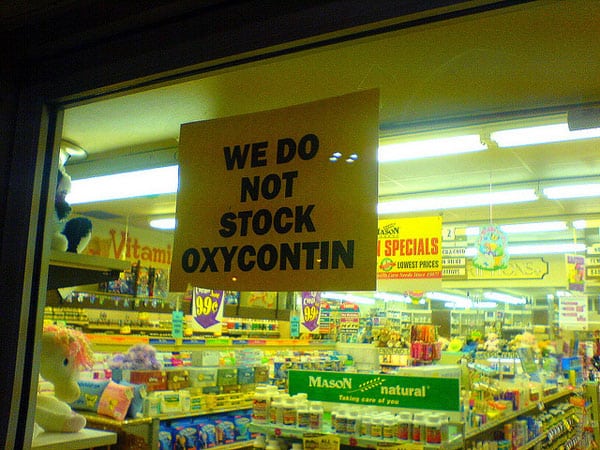
June 16, 2018; NBC News
Massachusetts Attorney General Maura Healey named eight Sackler family members as defendants this week in a complaint that accused Purdue Pharma of spinning a “‘web of illegal deceit’ to boost profits,” notes NBC News. The complaint also names eight executives.
As NPQ has covered, Purdue Pharma is owned by the descendants of Mortimer and Raymond Sackler, a family with an estimated net worth of $13 billion. OxyContin, adds NBC News, has generated more than $35 billion in revenue for Purdue Pharma since 1995. A large portion of the Sackler family fortune is due to profits earned from the drug.
In its complaint, the attorney general’s office summarizes its rationale for naming Sackler family members and Purdue Pharma directors as personally liable.
The directors and CEOs had oversight and control over the unlawful sales and marketing conduct at issue in this Complaint, and they are personally liable for the misconduct because: (a) they participated in the misconduct; and/or (b) they knew about the misconduct and failed to stop it; and/or (c) they should have known about the misconduct and they failed to stop it. In this case, the directors and CEOs are personally liable for all three reasons.
In addition to providing supporting evidence to buttress the above assertion, the lawsuit identifies three primary causes of action as the rationale for establishing Purdue Pharma’s and its codefendants’ legal liability: 1) unfair and deceptive acts and practices, 2) public nuisance, and 3) negligence. These causes of action broadly reflect the claims made in many of the 200-plus lawsuits filed by other states, local governments, and American Indian nations to date. In Cleveland, Ohio, federal judge Dan Aaron Polster is overseeing a process that aims to consolidate these cases and pushing for a settlement. An initial trial date, however, has been set for March 18, 2019.
Sackler-owned Purdue patented the drug OxyContin and played a large role in the production, sale, and marketing of the drug. According to the federal Centers for Disease Control and Prevention, prescribed opioids alone are estimated to be responsible for the deaths of over 200,000 Americans since 1999, with 2016 fatality levels five times higher than 1999 levels.
Sign up for our free newsletters
Subscribe to NPQ's newsletters to have our top stories delivered directly to your inbox.
By signing up, you agree to our privacy policy and terms of use, and to receive messages from NPQ and our partners.
According to Healey’s lawsuit, in Massachusetts, over 11,000 have died from opioid-related overdoses in the past decade. And, in Massachusetts, as in the nation, opioid-related fatalities have been rising—from 590 in 2010 to 2,155 in 2016, before falling slightly to 1,977 in 2017.
Writing in the Guardian, Joanna Walters notes, “The Sacklers being sued are: Theresa and Beverly, the widows of the brothers Mortimer and Raymond Sackler who built the company into the narcotics giant it is today; Ilene, Kathe and Mortimer David Alfons Sackler, three of Mortimer’s children; Jonathan and Richard Sackler, Raymond’s two sons; and David Sackler, Raymond’s grandson.” (Descendants of Arthur Sackler, the older brother of Mortimer and Raymond, are not named in the lawsuit, as Arthur passed away before OxyContin was invented and the other two brothers bought out his estate’s interest shortly after Arthur’s death.)
The suit filed by Massachusetts doesn’t name a dollar figure, but NBC News notes that, “Healey asked a judge to order the Sacklers and Purdue to ‘pay full and complete restitution to every person who has suffered any ascertainable loss by reason of their unlawful conduct.’”
Mike Moore, a former Mississippi attorney general who was a central figure in the state tobacco lawsuits two decades ago and is also involved in the current opioid litigation, calls Healey’s decision to name the Sacklers as defendants. “a brilliant legal strategy.”
Moore says that naming the Sacklers “pulls up the corporate curtain of protection that these people hide behind. The Sacklers personally made billions of dollars while tens of thousands of overdose deaths were occurring as a direct result of their lies about the addictiveness and effectiveness of OxyContin, the drug they created and marketed. Just as these folks like to be honored when they write big checks to museums and have their names inscribed on plaques for their contributions to so many causes, they should be held accountable for how they made that money in the first place.”
Emalie Gainey, a spokeswoman for Healey, notes that naming the Sacklers was done “to hold them individually liable for the role we allege they played.” At a press conference, Healey herself points out that, “Not only did we name the company today, but we’ve also chose to name executives and directors. Ours is the first lawsuit in the country to name those executives personally and tell the story of how they contributed to this deadly crisis.”—Steve Dubb












